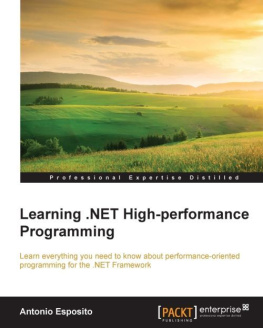Hoffman - Motivation for Learning and Performance
Here you can read online Hoffman - Motivation for Learning and Performance full text of the book (entire story) in english for free. Download pdf and epub, get meaning, cover and reviews about this ebook. year: 2015, publisher: Elsevier Science & Technology, genre: Romance novel. Description of the work, (preface) as well as reviews are available. Best literature library LitArk.com created for fans of good reading and offers a wide selection of genres:
Romance novel
Science fiction
Adventure
Detective
Science
History
Home and family
Prose
Art
Politics
Computer
Non-fiction
Religion
Business
Children
Humor
Choose a favorite category and find really read worthwhile books. Enjoy immersion in the world of imagination, feel the emotions of the characters or learn something new for yourself, make an fascinating discovery.

- Book:Motivation for Learning and Performance
- Author:
- Publisher:Elsevier Science & Technology
- Genre:
- Year:2015
- Rating:3 / 5
- Favourites:Add to favourites
- Your mark:
- 60
- 1
- 2
- 3
- 4
- 5
Motivation for Learning and Performance: summary, description and annotation
We offer to read an annotation, description, summary or preface (depends on what the author of the book "Motivation for Learning and Performance" wrote himself). If you haven't found the necessary information about the book — write in the comments, we will try to find it.
Motivation for Learning and Performance — read online for free the complete book (whole text) full work
Below is the text of the book, divided by pages. System saving the place of the last page read, allows you to conveniently read the book "Motivation for Learning and Performance" online for free, without having to search again every time where you left off. Put a bookmark, and you can go to the page where you finished reading at any time.
Font size:
Interval:
Bookmark:

- Tables in 1
- Tables in 2
- Tables in 3
- Tables in 5
- Tables in 6
- Tables in 7
- Tables in 8
- Tables in 9
- Tables in 10
- Tables in 12
- Figures in 3
- Figures in 4
- Figures in 11
Bobby Hoffman
University of Central Florida, Orlando, Florida

Academic Press is an imprint of Elsevier
525 B Street, Suite 1800, San Diego, CA 92101-4495, USA
The Boulevard, Langford Lane, Kidlington, Oxford OX5 1GB, UK
Copyright 2015 Elsevier Inc. All rights reserved.
No part of this publication may be reproduced or transmitted in any form or by any means, electronic or mechanical, including photocopying, recording, or any information storage and retrieval system, without permission in writing from the publisher. Details on how to seek permission, further information about the Publishers permissions policies and our arrangements with organizations such as the Copyright Clearance Center and the Copyright Licensing Agency, can be found at our website: www.elsevier.com/permissions.
This book and the individual contributions contained in it are protected under copyright by the Publisher (other than as may be noted herein).
Notices
Knowledge and best practice in this field are constantly changing. As new research and experience broaden our understanding, changes in research methods, professional practices, or medical treatment may become necessary.
Practitioners and researchers must always rely on their own experience and knowledge in evaluating and using any information, methods, compounds, or experiments described herein. In using such information or methods they should be mindful of their own safety and the safety of others, including parties for whom they have a professional responsibility.
To the fullest extent of the law, neither the Publisher nor the authors, contributors, or editors, assume any liability for any injury and/or damage to persons or property as a matter of products liability, negligence or otherwise, or from any use or operation of any methods, products, instructions, or ideas contained in the material herein.
Except for individuals specifically noted as Motivational Leaders, all characters appearing in this work are fictitious. Any resemblance to real persons, living or dead, is purely coincidental.
ISBN: 978-0-12-800779-2
British Library Cataloguing-in-Publication Data
A catalogue record for this book is available from the British Library.
Library of Congress Cataloging-in-Publication Data
A catalog record for this book is available from the Library of Congress.
For Information on all Academic Press publications visit our website at http://store.elsevier.com/
Typeset by MPS Limited, Chennai, India www.adi-mps.com
Printed and bound in the United States

Publisher: Nikki Levy
Editorial Project Manager: Barbara Makinster
Production Project Manager: Lisa Jones
Designer: Matthew Limbert
Did you make any important decisions today? You may have contemplated what clothes to wear, which foods you will eat, or what time to leave your house, if at all. You may have pondered the challenges in your life and considered which tasks you were ready to tackle. Outcomes from these daily decisions will likely influence what you accomplish, your mood and feelings, your physical well-being, and possibly how others perceive you and your abilities. Conceivably, you may have also thought about some more significant decisions today, such as what school to attend, where to work, or who is worthy of your time and affection. Perhaps you are carefree and resist making concrete plans. Instead, you take each day as it comes and rarely worry about what happens next. Friends may describe you as having a clear head or being a free spirit. Regardless of your approach, the focus of your thoughts and energy is directed toward reaching specific goals that may range from not getting off the couch to developing a cure for Ebola. But, if you are like most people, you often set attainable targets through conscious planning, deep thinking, and sustained effort as a means to reach those goals.
Three overarching objectives guided the design of this book, starting with clarifying the reasons for individual variation in our own thought and subsequent behaviors. Have you ever wondered why you are interested in some topics but not others, how you decided upon a job or career, or even what contributes to your choice of friends or a partner in life? Answers to these types of questions can explain the intensity and direction of your effort, otherwise known as understanding motivations and motivated action. For example, why might you decline an invitation to attend a wedding, while others in your family attend enthusiastically? Why do you perform better on some tasks than on others? Why is it that some people dominate meetings or classroom discussions while you rarely respond when a question is asked? Do you think you know the motives behind your behavior? Maybe you do, but more likely you do NOT, according to motivational science! As you read this book, you will become increasingly aware about who you are and why you do the things you do. Greater awareness will help you set realistic goals, enhance the probability of reaching your targets, and allow you to consider alternative and efficient strategies to reach your desired objectives.
A second goal of the text is to help you understand the intentions, thoughts, behaviors, and motivation of others. Many of us are responsible for the leadership and guidance of students, co-workers, peers, or family members. As an educator, manager, coach, or parent, you are likely highly influential in teaching others new skills, modeling behaviors or setting performance targets, and helping others achieve their goals. For instance, do you know why some students willingly spend many hours on homework, yet others devote only a few minutes? Why do some employees work better in groups, while others barely pull their weight? Why do some athletes choke under pressure, while others with lesser skills excel? Your understanding of the personal motivation of others is one key to designing customized and optimal instruction, creating exciting learning environments, and cultivating performance excellence.
The third, and potentially the most important purpose of this book, is to deconstruct and describe the latest motivational research and empirically verified motivational strategies to improve learning and performance. Initially, you will learn the foundational principles of motivational science, including how to decipher different types of evidence. Next, you will develop a deep understanding of motivation by exposure to key motivational principles, empowering you to interact with teachers, psychologists, business leaders, athletes, and classmates, or most anyone interested in motivation. By the time you finish the book, you will know how to identify important motivational clues, how to interpret the evidence you discover, and which strategies and solutions work best to enhance performance motivation across a variety of diverse populations, cultures, and settings. Ultimately, you will learn how to apply motivational knowledge to influence change and achieve the academic, business, or personal goals of yourself and others.
Font size:
Interval:
Bookmark:
Similar books «Motivation for Learning and Performance»
Look at similar books to Motivation for Learning and Performance. We have selected literature similar in name and meaning in the hope of providing readers with more options to find new, interesting, not yet read works.
Discussion, reviews of the book Motivation for Learning and Performance and just readers' own opinions. Leave your comments, write what you think about the work, its meaning or the main characters. Specify what exactly you liked and what you didn't like, and why you think so.
















